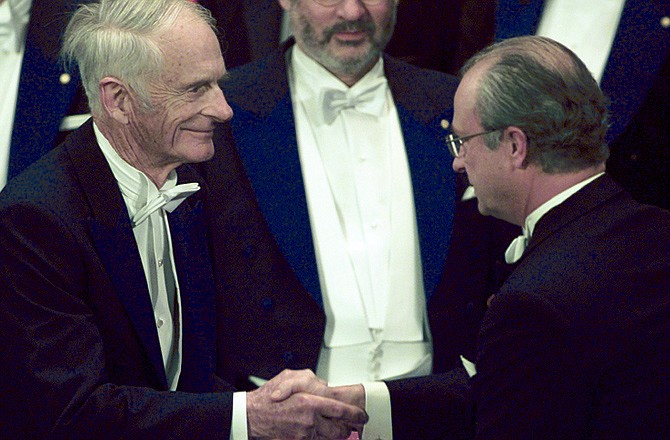ST. LOUIS (AP) - William S. Knowles, a longtime chemist who shared the Nobel Prize for discoveries that led to a treatment for Parkinson's disease and various other medicines, has died, his daughter said Monday. He was 95.
Knowles, of the St. Louis suburb of Chesterfield, Mo., died June 13. His daughter, Lesley McIntire of Kirkwood, Mo., said he died of complications from ALS.
Knowles retired in 1986 after 44 years working for St. Louis-based Monsanto Co. But it was 15 years later that he and two other scientists won the Nobel Prize in chemistry for work that led to discoveries now used to make various medicines, including antibiotics, heart drugs and widely used treatment for Parkinson's disease.
Monsanto said after the Nobel was announced that Knowles' research "changed the face of modern medicine."
Still, the Nobel was the last thing on his mind when Knowles - then 84 - was awakened at 4 a.m. in October 2001 by a caller from Sweden telling him he won a share of the prize.
"It just kind of overwhelmed me. I made sure it wasn't a joke," Knowles told The Associated Press at the time. "It was like, "What, little old me?'
"I never even thought such a thing was in the offing," he said. "I just really never thought I had any chance."
McIntire said that response was typical.
"My father was always very modest about his achievements," she said. "He did these amazing things, and he was certainly proud of his work, but he was very modest about it."
Knowles was born in Massachusetts in 1917 and earned a degree in chemistry from Harvard in 1939, then a graduate degree from Columbia three years later. He joined Monsanto in 1942.
In 1968, Knowles found a way to produce the helpful form of the amino acid L-dopa, which is used to treat Parkinson's. He and other researchers overcame a key problem in making drugs: The molecules of many substances used as drugs come in two forms that are mirror images of each other. Only one of these forms is helpful, while the other is inactive or even harmful.
The three men developed chemical catalysts to produce only the useful form of such molecules. The resulting batches of drug are more potent and lack the side effects that the other form of the molecule would cause.
He was an avid bicyclist and embraced environmental causes. Knowles and his wife, Nancy, owned a farm overlooking the Missouri River near St. Charles that they have willed to the county parks department.
Nancy Knowles survives, along with three daughters, one son and four grandchildren.
Knowles' body was cremated. A memorial service will be at 2 p.m. June 30 at Episcopal Church of the Good Shepherd in suburban St. Louis.

